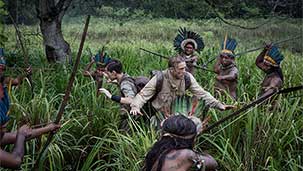"Ah, but a man's reach should exceed his grasp, Or what's a heaven for..."
~Robert Browning
The Lost City of Z must have been a bitch to work. A years-long development process, three potential leads at one time or another (Brad Pitt, Benedict Cumberbatch and then finally Charlie Hunnam), and a number of age specific roles that must have been cast and then re cast as the production dragged on. Not to mention finding exactly the right chemistry necessary for a number of vital supporting players.
But Jesus, did you hit this one out of the park.
Percy Fawcett was a real life British serviceman who spent a good part of his existence exploring the Amazon basin during the early 20th century. Fawcett is a mix of a woke Kipling protagonist, and Marlow from Conrad's Heart Of Darkness, but with substantially less imperialist condescension. Given the usual tropes that this kind of Great White Explorer narrative routinely deploys, it's surprising that The Lost City Of Z is less Indiana Jones and more a profound meditation on one man's search to find his place in the world.
Perhaps the biggest surprise of The Lost City Of Z is Charlie Hunnam's compelling portrayal of Percy Fawcett. Whoever made that bold decision saw something in him that, until this movie, I had not. I always found Hunnam (the lead in TV's Son's Of Anarchy and the mostly forgettable Pacific Rim) to be pretty thin as an actor. He usually looked the part, but he often seemed to disappear in scenes when playing against anyone even halfway charismatic. Here, though, he is quietly mesmerizing, and despite great turns from Sienna Miller, Robert Pattinson (another surprise), and Tom Holland, he never fails to hold the screen.
Fawcett was one of many famous early 20th century explorers/surveyors, but what set him apart was his atypical view that South America, and specifically the Amazon, rather than being a hellish "green desert'' that could only sustain small nomadic tribes, had once been home to a vast, sophisticated culture. The importance of that was how it brought him into direct conflict with the consensus view at the time: that the indigenous peoples of South America were nothing more than another population to condescend to, or exploit. Often both.
Given that already rich tapestry, The Lost City of Z could have easily just been the story of one man's doomed struggle against the unfettered imperial tendencies of the West, risking the whole tired white saviour paradigm. Or even simply defaulting to another man-against-nature, red in tooth or claw tale. Instead, director James Gray has fashioned a quietly thoughtful tale of Fawcett as a man struggling against his own preconceptions, awakened to possibilities by a place that is both alien to him, yet far more metaphysically comprehensible than what he has left behind.
The Lost City of Z is arthouse cinema disguised as high adventure and it works magnificently. Despite the exotic settings and often precarious circumstances, it is a film that depends upon nuanced performances from the entire cast. Its characters are human beings who are often at war with themselves and the culture that spawned them—and all of them are searching for their particular version of peace. That each one is worth following on these explorations (literal or otherwise) is, at least in part, down to the choices you helped make.
Sincerely,

Tim







